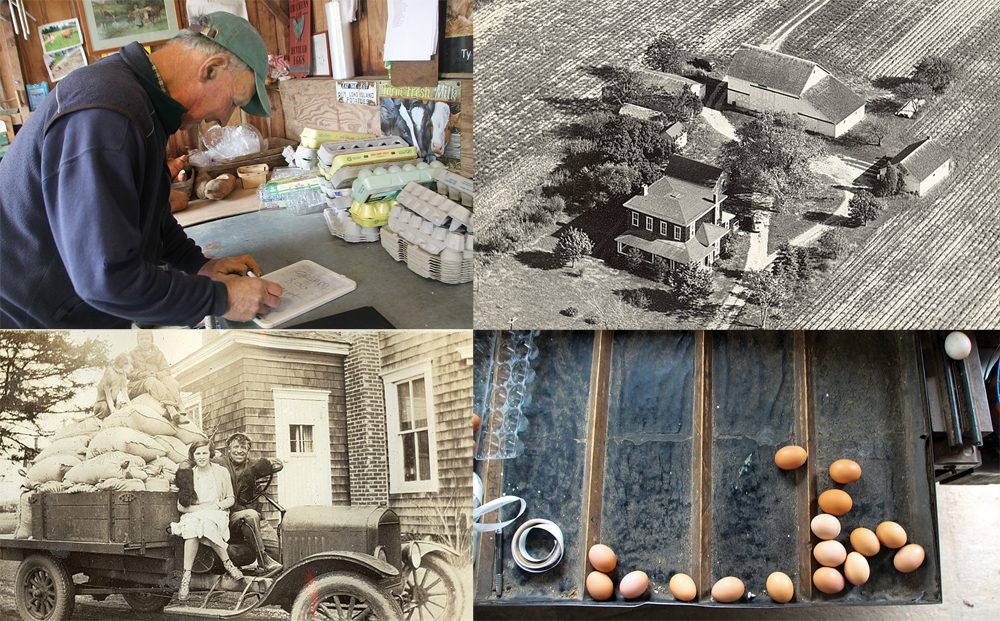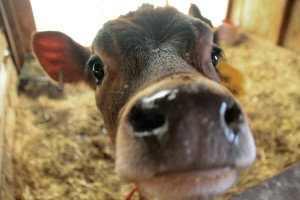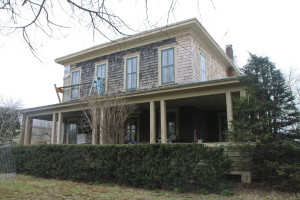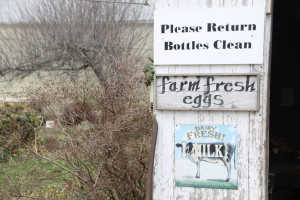After 142 years, Ty Llwyd Farm is becoming a national treasure


David Wines remembers playing at his grandmother’s place on Sound Avenue in Northville — racing around the old farmhouse on a go-kart, growing squash in the garden and pretending he was pulling a tractor like the adults in his family.
“We used to play farmer,” he said.
Decades later, Mr. Wines, 66, lives with his wife, Liz, and son, Chris, in that same house, from which they run the Harrison Downs farmstead — now called Ty Llwyd (pronounced “tee-clewed”) Farm — feeding chickens and cows and growing vegetables on the property that’s been in the family for six generations.
Now, the Harrison Downs farmstead — including the historic house, barn and several other original structures — is set to join more than a dozen other historic local sites on the National Register of Historic Places. The property will earn the same designation as nearby landmarks like the Big Duck in Flanders and Vail-Leavitt Music Hall in downtown Riverhead. It will be the 11th individual property in Riverhead on the list. Downtown Riverhead itself is also listed as a historic district.
Last week, the farm was added to New York State’s historic register, with a national designation all but approved. The designation doesn’t place any restrictions on the property, but would allow the Wines family to apply for certain grants if they need to restore a structure there, said David’s brother Richard Wines. Both are great-great-great nephews of the farm’s founder.
The site was chosen for its unique history as the North Fork’s most complete farmstead, with many buildings that are more than 100 years old.
“The heart of the farm hasn’t changed much in the last century,” said Richard Wines, a local historian and member of Riverhead Town’s Landmarks Preservation Committee. “Basically, the whole farmstead is intact.”
The property was among 19 additions to the state historic register announced last Wednesday by Gov. Andrew Cuomo’s office.
 “These landmarks are a part of our rich and storied history and helped define what it means to be a New Yorker,” Mr. Cuomo said in a statement. “By placing these landmarks on the State and National Registers of Historic Places, we are preserving their legacies and ensuring that they will be enjoyed for generations to come.”
“These landmarks are a part of our rich and storied history and helped define what it means to be a New Yorker,” Mr. Cuomo said in a statement. “By placing these landmarks on the State and National Registers of Historic Places, we are preserving their legacies and ensuring that they will be enjoyed for generations to come.”
Harrison Downs, a New York City lawyer who grew up on the North Fork, built the farmhouse in 1874. Unlike other contemporary members of his family, he was educated at some of the Northeast’s most prestigious institutions, earning diplomas from Yale University and Columbia Law School.
Mr. Downs was a “gentleman farmer,” Richard Wines said. He didn’t actually farm the property himself, unlike other local families who worked their own land.
Instead, he said, the farmhouse was built to be trendy. The two-story home is in the Italianate style — similar to Jedediah Hawkins Inn in nearby Jamesport — that was popular among the elite of the day, he said.
It features a flat roof with large eaves, high (and highly impractical) 10-foot ceilings and is clad in unpainted cedar shingles. The house also featured a ballroom on the second floor, though records of whether Mr. Downs hosted parties there aren’t available. The ballroom was later converted into separate bedrooms.
The house definitely stood out from others nearby, which were much more practical and modest, Mr. Wines said.
“It was fashionable — the kind of thing someone from New York City would build, not a local farmer,” he said.
Mr. Downs never married or had children. He died in 1912 and the farm was inherited by his nephew, Lewis E. Downs. Four years later, Lewis Downs passed the farm to his son, L. Leland Downs, who moved in after his honeymoon in 1916. Wooden cupboards that were installed in the kitchen that year remain in the house to this day.
Leland Downs and his wife, Mary Wells, made many additions to the farm. The original barn on the property had burned down, so the couple built a new barn 100 years ago, which also remains in use.
The English-style barn — once popular on the North Fork — measures 30 feet by 42 feet. A shed adds an extra 22 feet on the west and was once used as a horse pen. Today, it holds chickens and farming equipment. Richard Wines can recall playing in the barn’s loft as a child.
The property saw other additions during this time, including a “Man’s House” used by hired help, an old chicken house and a side-gable structure plucked from Camp Upton during an auction in 1917. A washhouse was installed near the home in the early 1920s. David Wines now uses it to sort and store eggs.
Leland Downs ran the farm for years, though the business was difficult. David Wines said prices for potatoes fluctuated wildly, leading to big profits some years and harsh losses the other.
“It was gambling in every sense of the word,” Richard Wines said.
The stress became too much for Mr. Downs, who had a breakdown after several years of bad harvests in the 1930s and was sent to Kings Park Psychiatric Center, Mr. Wines said. Family members took over the farm, later handing it over to David Wines in 1974.
David and Elizabeth Wines have been farming on the land ever since. In his first year, Mr. Wines said, he made just $300 for the season and wondered whether he should stay in the potato business.
But the family did. The Harrison Downs farmstead was renamed Ty Llwyd in celebration of Ms. Wines heritage as the daughter of Welsh dairy farmers. The name itself translates to “brown house,” a nod to the farmhouse’s original wooden shingles.
Today, David Wines said, they are almost completely out of the potato business, which dried up on the North Fork in the mid-1980s. Ty Llwyd Farm now focuses mostly on livestock, with about 1,400 chickens that produce some 900 eggs per day in the summer, and a growing dairy operation founded a few years ago by Chris Wines.
 David Wines said about 60 to 100 people visit the farm each day. The family has laid a hose across the driveway that rings a bell when new customers arrive, like some gas stations.
David Wines said about 60 to 100 people visit the farm each day. The family has laid a hose across the driveway that rings a bell when new customers arrive, like some gas stations.
During a recent interview, Richard Wines, who was sitting inside the farmhouse at the same dining room set owned by his ancestors, joked that the bell has gone off during birthday celebrations and Thanksgiving dinners. Life on a farm is never dull, David Wines agreed. At that moment, a piece of the chair Richard was sitting on snapped and a large crack ran up its side.
“You gotta be careful about what chair you sit in!” David Wines exclaimed with a laugh, pulling away the piece of furniture away. He would fix it with wood glue later — a farmer always repairs what he can before throwing things away, he said.
That ethos extends throughout the house, where the Wineses live much the same way as the generations before them. The house has no central heating — just a couple of wood-burning stoves.
Like his grandfather, David Wines wakes up early, long before the sun rises, and sets to work cleaning the dairy barn and feeding the chickens. He’s got buildings that “always need fixing.”
It’s the same challenging farmer’s life he’s lived since he was a boy, but it’s a fulfilling life that he and his family couldn’t imagine giving up.
“It’s all I’ve ever done,” he said. “It’s a love of it. It gets better every year, more fun every year … Why hire somebody to have all that fun when you can do it?”
Photo credits: Paul Squire, Suffolk County Historical Society, Richard Wines


